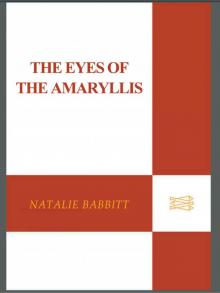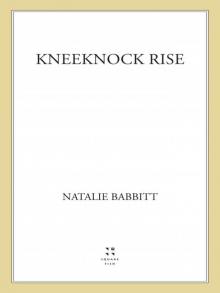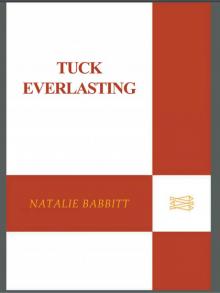- Home
- Natalie Babbitt
Tuck Everlasting Page 4
Tuck Everlasting Read online
Page 4
And still this was not all. For, on the old beamed ceiling of the parlor, streaks of light swam and danced and wavered like a bright mirage, reflected through the windows from the sunlit surface of the pond. There were bowls of daisies everywhere, gay white and yellow. And over everything was the clean, sweet smell of the water and its weeds, the chatter of a swooping kingfisher, the carol and trill of a dozen other kinds of bird, and occasionally the thrilling bass note of an unastonished bullfrog at ease somewhere along the muddy banks.
Into it all came Winnie, eyes wide, and very much amazed. It was a whole new idea to her that people could live in such disarray, but at the same time she was charmed. It was…comfortable. Climbing behind Mae up the stairs to see the loft, she thought to herself: “Maybe it’s because they think they have forever to clean it up.” And this was followed by another thought, far more revolutionary: “Maybe they just don’t care!”
“The boys don’t be home very much,” said Mae as they came up into the half light of the loft. “But when they are, they bed up here. There’s plenty of room.” The loft was cluttered, too, with all kinds of odds and ends, but there were two mattresses rolled out on the floor, and fresh sheets and blankets were folded almost neatly on each, waiting to be spread.
“Where do they go when they’re away?” asked Winnie. “What do they do?”
“Oh,” said Mae, “they go different places, do different things. They work at what jobs they can get, try to bring home some of their money. Miles can do carpentering, and he’s a pretty fair blacksmith, too. Jesse now, he don’t ever seem too settled in himself. Course, he’s young.” She stopped and smiled. “That sounds funny, don’t it? Still, it’s true, just the same. So Jesse, he does what strikes him at the moment, working in the fields, or in saloons, things like that, whatever he comes across. But they can’t stay on in any one place for long, you know. None of us can. People get to wondering.” She sighed. “We been in this house about as long as we dare, going on twenty years. It’s a right nice place. Tuck’s got so’s he’s real attached to it. Then, too, it’s off by itself, plenty of fish in the pond, not too far from the towns around. When we need things, we go sometimes to one, sometimes the next, so people don’t come to notice us much. And we sell where we can. But I guess we’ll be moving on, one of these days. It’s just about time.”
It sounded rather sad to Winnie, never to belong anywhere. “That’s too bad,” she said, glancing shyly at Mae. “Always moving around and never having any friends or anything.”
But Mae shrugged off this observation. “Tuck and me, we got each other,” she said, “and that’s a lot. The boys, now, they go their separate ways. They’re some different, don’t always get on too good. But they come home whenever the spirit moves, and every ten years, first week of August, they meet at the spring and come home together so’s we can be a family again for a little while. That’s why we was there this morning. One way or another, it all works out.” She folded her arms and nodded, more to herself than to Winnie. “Life’s got to be lived, no matter how long or short,” she said calmly. “You got to take what comes. We just go along, like everybody else, one day at a time. Funny—we don’t feel no different. Leastways, I don’t. Sometimes I forget about what’s happened to us, forget it altogether. And then sometimes it comes over me and I wonder why it happened to us. We’re plain as salt, us Tucks. We don’t deserve no blessings—if it is a blessing. And, likewise, I don’t see how we deserve to be cursed, if it’s a curse. Still—there’s no use trying to figure why things fall the way they do. Things just are, and fussing don’t bring changes. Tuck, now, he’s got a few other ideas, but I expect he’ll tell you. There! The boys are in from the pond.”
Winnie heard a burst of voices downstairs, and in a moment Miles and Jesse were climbing to the loft.
“Here, child,” said Mae hastily. “Hide your eyes. Boys? Are you decent? What’d you put on to swim in? I got Winnie up here, do you hear me?”
“For goodness’ sake, Ma,” said Jesse, emerging from the stairwell. “You think we’re going to march around in our altogether with Winnie Foster in the house?”
And Miles, behind him, said, “We just jumped in with our clothes on. Too hot and tired to shed ’em.”
It was true. They stood there side by side with their wet clothes plastered to their skins, little pools of water collecting at their feet.
“Well!” said Mae, relieved. “All right. Find something dry to put on. Your pa’s got supper nearly ready.” And she hustled Winnie down the narrow stairs.
11
It was a good supper, flapjacks, bacon, bread, and applesauce, but they ate sitting about in the parlor instead of around a table. Winnie had never had a meal that way before and she watched them carefully at first, to see what rules there might be that she did not know about. But there seemed to be no rules. Jesse sat on the floor and used the seat of a chair for a table, but the others held their plates in their laps. There were no napkins. It was all right, then, to lick the maple syrup from your fingers. Winnie was never allowed to do such a thing at home, but she had always thought it would be the easiest way. And suddenly the meal seemed luxurious.
After a few minutes, however, it was clear to Winnie that there was at least one rule: As long as there was food to eat, there was no conversation. All four Tucks kept their eyes and their attention on the business at hand. And in the silence, given time to think, Winnie felt her elation, and her thoughtless pleasure, wobble and collapse.
It had been different when they were out-of-doors, where the world belonged to everyone and no one. Here, everything was theirs alone, everything was done their way. Eating, she realized now, was a very personal thing, not something to do with strangers. Chewing was a personal thing. Yet here she was, chewing with strangers in a strange place. She shivered a little, and frowned, looking round at them. That story they had told her—why, they were crazy, she thought harshly, and they were criminals. They had kidnapped her, right out of the middle of her very own wood, and now she would be expected to sleep—all night—in this dirty, peculiar house. She had never slept in any bed but her own in her life. All these thoughts flowed at once from the dark part of her mind. She put down her fork and said, unsteadily, “I want to go home.”
The Tucks stopped eating, and looked at her, surprised. Mae said soothingly, “Why, of course you do, child. That’s only natural. I’ll take you home. I promised I would, soon’s we’ve explained a bit as to why you got to promise you’ll never tell about the spring. That’s the only reason we brung you here. We got to make you see why.”
Then Miles said, cheerfully and with sudden sympathy, “There’s a pretty good old rowboat. I’ll take you out for a row after supper.”
“No, I will,” said Jesse. “Let me. I found her first, didn’t I, Winnie Foster? Listen, I’ll show you where the frogs are, and…”
“Hush,” Tuck interrupted. “Everyone hush. I’ll take Winnie rowing on the pond. There’s a good deal to be said and I think we better hurry up and say it. I got a feeling there ain’t a whole lot of time.”
Jesse laughed at this, and ran a hand roughly through his curls. “That’s funny, Pa. Seems to me like time’s the only thing we got a lot of.”
But Mae frowned. “You worried, Tuck? What’s got you? No one saw us on the way up. Well, now, wait a bit—yes, they did, come to think of it. There was a man on the road, just outside Treegap. But he didn’t say nothing.”
“He knows me, though,” said Winnie. She had forgotten, too, about the man in the yellow suit, and now, thinking of him, she felt a surge of relief. “He’ll tell my father he saw me.”
“He knows you?” said Mae, her frown deepening. “But you didn’t call out to him, child. Why not?”
“I was too scared to do anything,” said Winnie honestly.
Tuck shook his head. “I never thought we’d come to the place where we’d be scaring children,” he said. “I guess there’s no way to make it up to you, Winnie,
but I’m sure most awful sorry it had to happen like that. Who was this man you saw?”
“I don’t know his name,” said Winnie. “But he’s a pretty nice man, I guess.” In fact, he seemed supremely nice to her now, a kind of savior. And then she added, “He came to our house last night, but he didn’t go inside.”
“Well, that don’t sound too serious, Pa,” said Miles. “Just some stranger passing by.”
“Just the same, we got to get you home again, Winnie,” said Tuck, standing up decisively. “We got to get you home just as fast as we can. I got a feeling this whole thing is going to come apart like wet bread. But first we got to talk, and the pond’s the best place. The pond’s got answers. Come along, child. Let’s go out on the water.”
12
The sky was a ragged blaze of red and pink and orange, and its double trembled on the surface of the pond like color spilled from a paintbox. The sun was dropping fast now, a soft red sliding egg yolk, and already to the east there was a darkening to purple. Winnie, newly brave with her thoughts of being rescued, climbed boldly into the rowboat. The hard heels of her buttoned boots made a hollow banging sound against its wet boards, loud in the warm and breathless quiet. Across the pond a bullfrog spoke a deep note of warning. Tuck climbed in, too, pushing off, and, settling the oars into their locks, dipped them into the silty bottom in one strong pull. The rowboat slipped from the bank then, silently, and glided out, tall water grasses whispering away from its sides, releasing it.
Here and there the still surface of the water dimpled, and bright rings spread noiselessly and vanished. “Feeding time,” said Tuck softly. And Winnie, looking down, saw hosts of tiny insects skittering and skating on the surface. “Best time of all for fishing,” he said, “when they come up to feed.”
He dragged on the oars. The rowboat slowed and began to drift gently toward the farthest end of the pond. It was so quiet that Winnie almost jumped when the bullfrog spoke again. And then, from the tall pines and birches that ringed the pond, a wood thrush caroled. The silver notes were pure and clear and lovely.
“Know what that is, all around us, Winnie?” said Tuck, his voice low. “Life. Moving, growing, changing, never the same two minutes together. This water, you look out at it every morning, and it looks the same, but it ain’t. All night long it’s been moving, coming in through the stream back there to the west, slipping out through the stream down east here, always quiet, always new, moving on. You can’t hardly see the current, can you? And sometimes the wind makes it look like it’s going the other way. But it’s always there, the water’s always moving on, and someday, after a long while, it comes to the ocean.”
They drifted in silence for a time. The bullfrog spoke again, and from behind them, far back in some reedy, secret place, another bullfrog answered. In the fading light, the trees along the banks were slowly losing their dimensions, flattening into silhouettes clipped from black paper and pasted to the paling sky. The voice of a different frog, hoarser and not so deep, croaked from the nearest bank.
“Know what happens then?” said Tuck. “To the water? The sun sucks some of it up right out of the ocean and carries it back in clouds, and then it rains, and the rain falls into the stream, and the stream keeps moving on, taking it all back again. It’s a wheel, Winnie. Everything’s a wheel, turning and turning, never stopping. The frogs is part of it, and the bugs, and the fish, and the wood thrush, too. And people. But never the same ones. Always coming in new, always growing and changing, and always moving on. That’s the way it’s supposed to be. That’s the way it is.”
The rowboat had drifted at last to the end of the pond, but now its bow bumped into the rotting branches of a fallen tree that thrust thick fingers into the water. And though the current pulled at it, dragging its stern sidewise, the boat was wedged and could not follow. The water slipped past it, out between clumps of reeds and brambles, and gurgled down a narrow bed, over stones and pebbles, foaming a little, moving swiftly now after its slow trip between the pond’s wide banks. And, farther down, Winnie could see that it hurried into a curve, around a leaning willow, and disappeared.
“It goes on,” Tuck repeated, “to the ocean. But this rowboat now, it’s stuck. If we didn’t move it out ourself, it would stay here forever, trying to get loose, but stuck. That’s what us Tucks are, Winnie. Stuck so’s we can’t move on. We ain’t part of the wheel no more. Dropped off, Winnie. Left behind. And everywhere around us, things is moving and growing and changing. You, for instance. A child now, but someday a woman. And after that, moving on to make room for the new children.”
Winnie blinked, and all at once her mind was drowned with understanding of what he was saying. For she—yes, even she—would go out of the world willy-nilly someday. Just go out, like the flame of a candle, and no use protesting. It was a certainty. She would try very hard not to think of it, but sometimes, as now, it would be forced upon her. She raged against it, helpless and insulted, and blurted at last, “I don’t want to die.”
“No,” said Tuck calmly. “Not now. Your time’s not now. But dying’s part of the wheel, right there next to being born. You can’t pick out the pieces you like and leave the rest. Being part of the whole thing, that’s the blessing. But it’s passing us by, us Tucks. Living’s heavy work, but off to one side, the way we are, it’s useless, too. It don’t make sense. If I knowed how to climb back on the wheel, I’d do it in a minute. You can’t have living without dying. So you can’t call it living, what we got. We just are, we just be, like rocks beside the road.”
Tuck’s voice was rough now, and Winnie, amazed, sat rigid. No one had ever talked to her of things like this before. “I want to grow again,” he said fiercely, “and change. And if that means I got to move on at the end of it, then I want that, too. Listen, Winnie, it’s something you don’t find out how you feel until afterwards. If people knowed about the spring down there in Treegap, they’d all come running like pigs to slops. They’d trample each other, trying to get some of that water. That’d be bad enough, but afterwards—can you imagine? All the little ones little forever, all the old ones old forever. Can you picture what that means? Forever? The wheel would keep on going round, the water rolling by to the ocean, but the people would’ve turned into nothing but rocks by the side of the road. ’Cause they wouldn’t know till after, and then it’d be too late.” He peered at her, and Winnie saw that his face was pinched with the effort of explaining. “Do you see, now, child? Do you understand? Oh, Lord, I just got to make you understand!”
There was a long, long moment of silence. Winnie, struggling with the anguish of all these things, could only sit hunched and numb, the sound of the water rolling in her ears. It was black and silky now; it lapped at the sides of the rowboat and hurried on around them into the stream.
And then, down the length of the pond, a voice rang out. It was Miles, and every word, across the water, came clearly to their ears. “Pa! Pa, come back! Something’s happened, Pa. The horse is gone. Can you hear me? Someone’s stole the horse.”
13
Sometime later, the man in the yellow suit slipped down from the saddle and tied the Tucks’ old horse to a bar of the Fosters’ fence. He tried the gate. It was unlocked. He pushed through and strode up the path to the door of the cottage. Though it was very late now, almost midnight, the windows glowed golden: the family had not gone to bed. The man in the yellow suit took off his hat and smoothed his hair with long white fingers. Then he knocked at the door. It was opened at once by Winnie’s grandmother, and before she could speak, the man said quickly, “Ah! Good evening! May I come in? I have happy news for you. I know where they’ve taken the little girl.”
14
There had been nothing for the Tucks to do but go to bed. It was too dark now to go out looking for the horse thief, and anyway, they had no idea when he had done his thieving or which way he had gone.
“That beats all, though, don’t it, Pa,” said Jesse, “coming up to a person’s house and stea
ling their horse right out from under their nose!”
“I got to give you that,” said Tuck. “But the question is, was it just some ordinary thief, or was it someone that had some special reason? I don’t like it. I got a bad feeling about the whole thing.”
“Hush now, Tuck,” said Mae. She was spreading a quilt on the old sofa, making it into a bed for Winnie. “You’re too much of a worrier. There’s nothing we can do about it now, so there’s no sense fussing. You got no reason to think there’s anything peculiar about it, anyway. Come on, we’ll get a good night’s sleep and figure it out in the morning when we’re fresh. Boys, up you go, and don’t get talking—you’ll keep us awake. Winnie, child, you bed down, too. You’ll sleep first-rate on the sofa here.”
But Winnie did not sleep at all, not for a long, long time. The cushions of the sofa were remarkably lumpy and smelled like old newspapers; and the chair pad Mae had given her for a pillow was thin and hard, and rough under her cheek. But far worse than this was the fact that she was still in her clothes, for she had firmly refused the offer of Mae’s spare nightgown, with its seeming miles of faded cotton flannel. Only her own nightgown would do, and the regular bedtime routine; without them, she was painfully lonely for home. Her joy on the road that morning had completely disappeared; the wide world shrank and her oldest fears rolled freely in her consciousness. It was unbelievable that she should be in this place; it was an outrage. But she was helpless to do anything about it, helpless to control it, and exhausted by the conversation in the rowboat.

 The Eyes of the Amaryllis
The Eyes of the Amaryllis Herbert Rowbarge
Herbert Rowbarge The Search for Delicious
The Search for Delicious Kneeknock Rise
Kneeknock Rise Goody Hall
Goody Hall Tuck Everlasting
Tuck Everlasting The Devil's Storybook
The Devil's Storybook The Moon Over High Street
The Moon Over High Street Phoebe's Revolt
Phoebe's Revolt Barking with the Big Dogs
Barking with the Big Dogs The Devil's Storybooks
The Devil's Storybooks